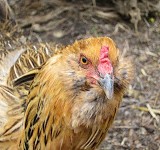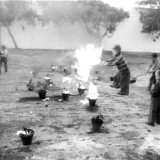
.
How to Raise Poultry covers our familiar feathered friends, chickens, ducks and turkeys but also details the history and husbandry of everything from swans to emus. While I may never keep ostriches, it certainly was entertaining to read about them (don’t mess with an angry one and get yourself a very tall fence!).
Throughout the book Heinrichs stresses the importance of preserving our agricultural heritage through keeping rare breeds and out of favor fowl. Paradoxically I can assure that there will be more geese by eating one. As Frank Bob Reese, a farmer Heinrichs quotes in the book puts it, “The best way to save the old-time poultry is to return them to our dining tables.”
The lavishly illustrated How to Raise Poultry will get you thinking about where your food comes from and what we’ve lost by our over-reliance on just a few varieties of poultry such as the Cornish Cross meat chicken. Hopefully it will inspire hobbyists and farmers alike to bring back the amazing diversity and beauty of thousands of years of living with domesticated birds.





My husband requested “no funny-looking chickens”…so I ended up buying two australorps and one barred rock. My “australorps” were actually black stars and the barred rock got killed by a possum and was replaced by some sort of Craigslist production red.
Hopefully my next round of chickens will be more heritage-y and cool!
I was stumbling about the Murray McMurray web site last night, looking at heritage breeds. They call themselves the world’s largest rare breed hatchery. Even so, some of the breeds on offer have limited availability, or no availability. But anyone interested in chickens should take a look at their site, because they have a lot of chickens that are different that what you think of when you think of backyard chickens. I know that when I’m ready, I’m going to want more birds than I can actually handle.
Paula- Murray McMurray’s availability is due to the hatching cycles at their facility and weather conditions around the country.
I’ve had some concerns of late with the offerings at the big hatcheries. I think the next time I get chickens I’ll seek out a local breeder instead. Sourcing poultry is a complicated issue–a lot of the fancy breeds used for showing no longer produce well in terms of eggs and meat–but these qualities can be bread back into them after a few generations. A lot of us, including myself, can’t keep roosters, so we have to leave the breeding to others. People like Christine Heinrichs and her colleagues at the Society for the Preservation of Poultry Antiquities are a really great resource and I’d suggest asking around before going to a hatchery.
We have some fancy breeds which, though not prolific egg layers, are worth their tiny weights in gold as excellent broody hens.
We also have hybrid layers and hybrid meat chickens which are fine, but can’t be raised “from seed” as it were and we have to buy day olds or eggs everytime we want a new batch. Then there’s the problem of what to do with cockerels.
We’ve come full circle, back to the idea of a dual purpose breed like a Sussex. Hens lay fine, Cockerels are big enough to eat and slower growing than the meat hybrids.
I know it’s a cliche but sometimes the old ways are the best ways for a reason.
Thanks for sharing this book – I had never heard of it before. As a neophyte just getting into this type of thing, I am very much appreciative.
-JW